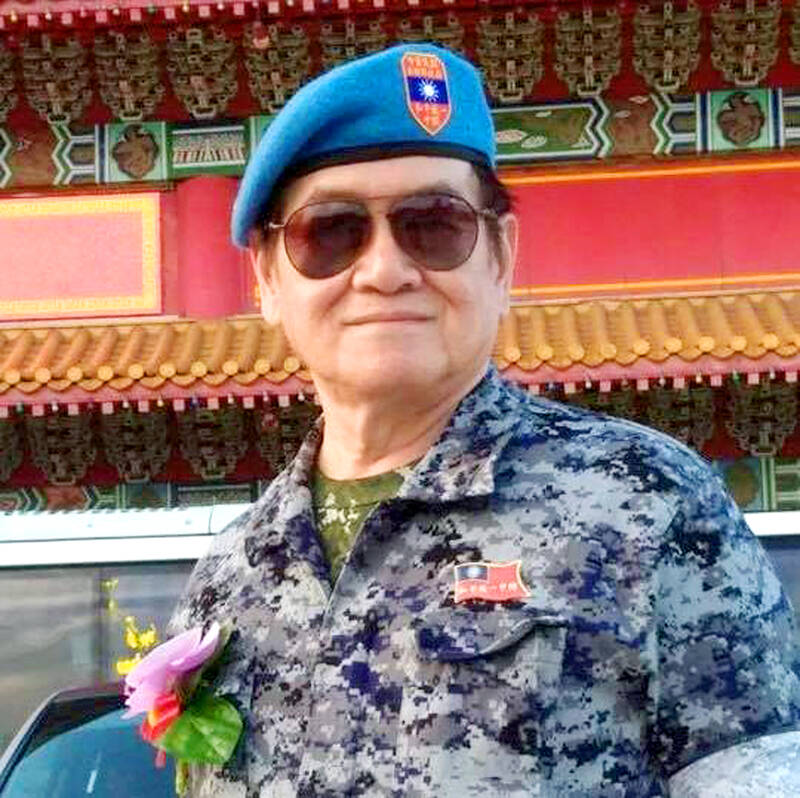A retired lieutenant general has been charged after using funds from China to recruit military personnel for an “armed” group that would assist invading Chinese forces, prosecutors said yesterday.
The retired officer, Kao An-kuo (高安國), was among six people indicted for contravening the National Security Act (國家安全法), the High Prosecutors’ Office said in a statement.
The group visited China multiple times, separately and together, from 2018 to last year, where they met Chinese military intelligence personnel for instructions and funding “to initiate and develop organizations for China,” prosecutors said.

Photo: screen grab from Kao An-kuo’s Facebook page
Their actions posed a “serious threat” to “national security and social stability,” the statement said.
After retiring from the army, Kao and another defendant used Chinese funds to form “an armed organization” — the “Republic of China Taiwan Military Government” — that would act as an “internal collaborator” if China attacked Taiwan, it said.
They also engaged in “scouting, contacting, wooing and absorbing retired and active service members,” putting national security in a “dangerous state,” it added.
Prosecutors have sought a minimum jail term of 10 years for Kao, saying that he failed his “high duty of loyalty to the country as a retired lieutenant general deputy commander for the sake of personal gain.”
The other defendants face up to eight years in jail, prosecutors said.
The statement did not say how much money Kao or the others received, but it has previously reported that the six defendants collectively received more than NT$9.62 million (US$293,525) in funding from China.
There has been a series of spying cases in Taiwan, as China maintains military and political pressure on Taipei.
The National Security Bureau said in a recent report that the number of people prosecuted for spying for Beijing has “increased significantly,” from 10 in 2022 to 64 last year.

CHAOS: Iranians took to the streets playing celebratory music after reports of Khamenei’s death on Saturday, while mourners also gathered in Tehran yesterday Iranian Supreme Leader Ayatollah Ali Khamenei was killed in a major attack on Iran launched by Israel and the US, throwing the future of the Islamic republic into doubt and raising the risk of regional instability. Iranian state television and the state-run IRNA news agency announced the 86-year-old’s death early yesterday. US President Donald Trump said it gave Iranians their “greatest chance” to “take back” their country. The announcements came after a joint US and Israeli aerial bombardment that targeted Iranian military and governmental sites. Trump said the “heavy and pinpoint bombing” would continue through the week or as long

TRUST: The KMT said it respected the US’ timing and considerations, and hoped it would continue to honor its commitments to helping Taiwan bolster its defenses and deterrence US President Donald Trump is delaying a multibillion-dollar arms sale to Taiwan to ensure his visit to Beijing is successful, a New York Times report said. The weapons sales package has stalled in the US Department of State, the report said, citing US officials it did not identify. The White House has told agencies not to push forward ahead of Trump’s meeting with Chinese President Xi Jinping (習近平), it said. The two last month held a phone call to discuss trade and geopolitical flashpoints ahead of the summit. Xi raised the Taiwan issue and urged the US to handle arms sales to

BIG SPENDERS: Foreign investors bought the most Taiwan equities since 2005, signaling confidence that an AI boom would continue to benefit chipmakers Taiwan Semiconductor Manufacturing Co’s (TSMC, 台積電) market capitalization swelled to US$2 trillion for the first time following a 4.25 percent rally in its American depositary receipts (ADR) overnight, putting the world’s biggest contract chipmaker sixth on the list of the world’s biggest companies by market capitalization, just behind Amazon.com Inc. The site CompaniesMarketcap.com ranked TSMC ahead of Saudi Aramco and Meta Platforms Inc. The Taiwanese company’s ADRs on Tuesday surged to US$385.75 on the New York Stock Exchange, as strong demand for artificial intelligence (AI) applications led to chip supply constraints and boost revenue growth to record-breaking levels. Each TSMC ADR represents

State-run CPC Corp, Taiwan (CPC, 台灣中油) yesterday said that it had confirmed on Saturday night with its liquefied natural gas (LNG) and crude oil suppliers that shipments are proceeding as scheduled and that domestic supplies remain unaffected. The CPC yesterday announced the gasoline and diesel prices will rise by NT$0.2 and NT$0.4 per liter, respectively, starting Monday, citing Middle East tensions and blizzards in the eastern United States. CPC also iterated it has been reducing the proportion of crude oil imports from the Middle East and diversifying its supply sources in the past few years in response to geopolitical risks, expanding